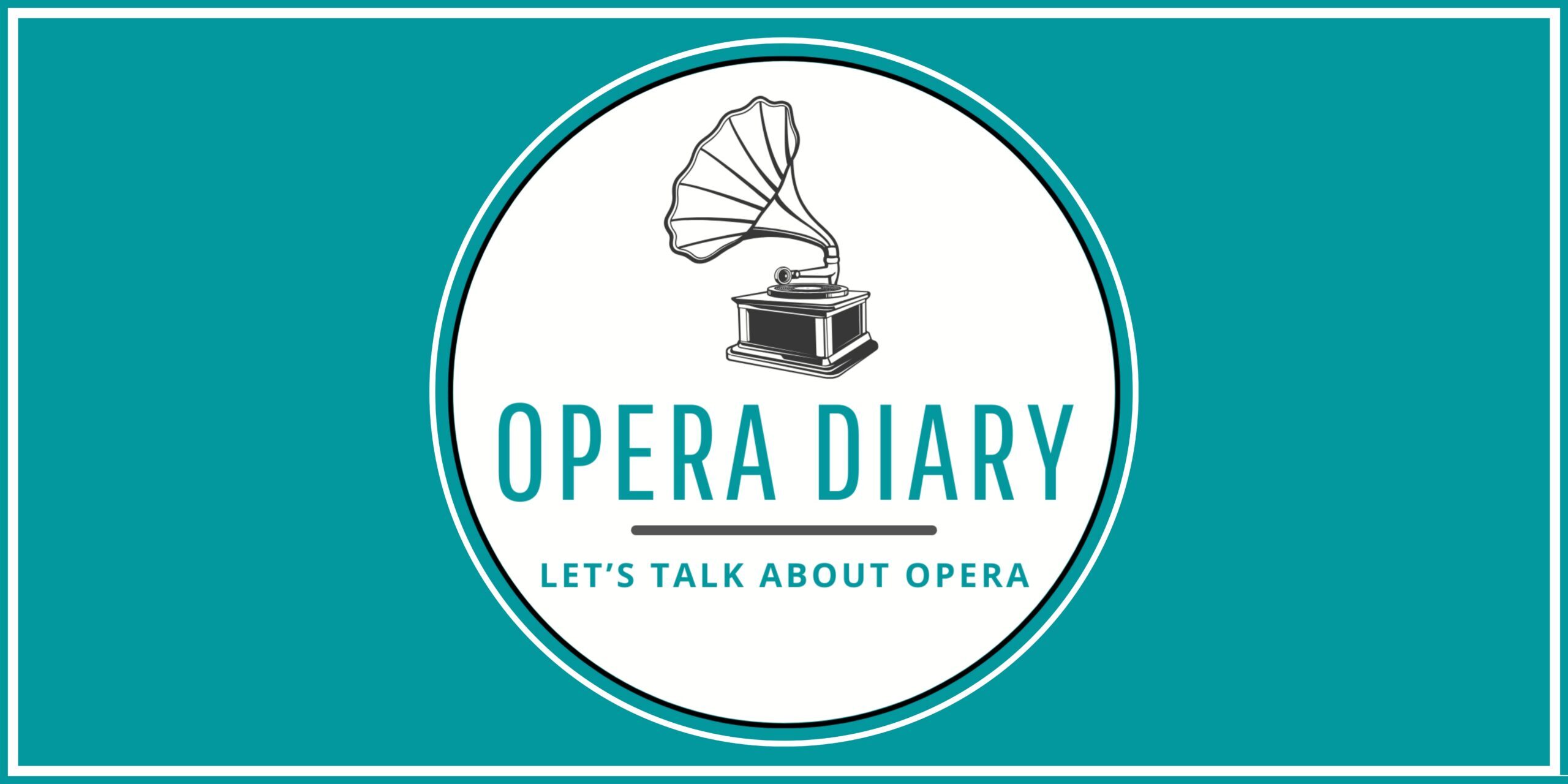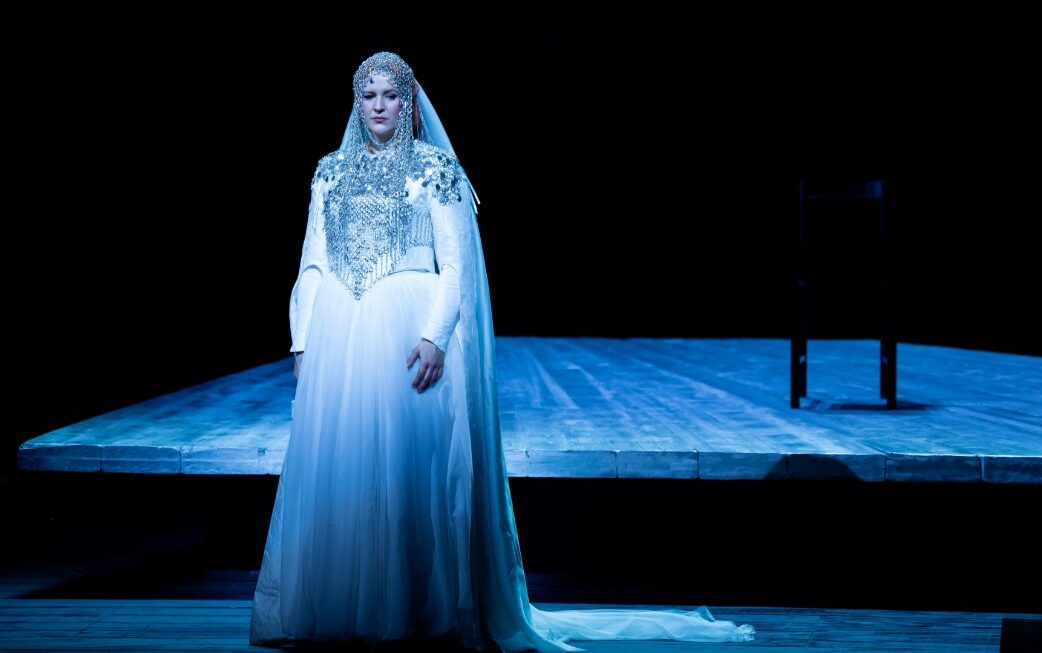We had already had the chance to see this production back in April. The impressions were overwhelmingly positive: the emotion was tangible, the vocal ensemble was magnificent, from the soloists to the choir, and the orchestral direction was dazzling. It was truly a vibrant evening.
Here we are again in September. As the curtain rises, the first feeling that washes over us is one of deep gratitude, filled with heartfelt solidarity. Let us explain: Kasper Holten’s staging sets the action in a kingdom where the fairytale elements of the original story meet the devastation of war. The echoes of current events are unmistakable, and strikingly intense. The young woman’s cry of despair as she discovers the lifeless body of someone dear to her, timed perfectly with the orchestral fortissimo as the main theme emerges in the prelude, unleashes such powerful emotion that tears are impossible to hold back. How many people in recent months have faced such pain?
This new performance brings three notable changes compared to the spring cast: Nina Stemme takes on the role of Ortrud, Egils Silins steps in as Friedrich von Telramund, and Marc Albrecht conducts the orchestra of the Deutsche Oper. Two names that, without a doubt, bring colours and intensity equal to those previously offered by Miina-Liisa Värelä, Martin Gantner and Constantin Trinks. The result lived up to the talent of these two masters of the operatic craft.
The Swedish soprano commands such a captivating presence that, from the moment she enters (during Byung Gil Kim’s Heinrich der Vogler vivid and vigorous Komm’ ich zu euch nun) our attention naturally turns to her. It is she who seeks out Flurina Stucki’s Elsa (still as moving as ever, with her broad, radiant singing perfectly attuned to the emotional depth of a role she inhabits with remarkable ease), blindfolded, as the male chorus intones Seht hin! Sie naht, die hart Beklagte. She portrays a deeply human character, with gestures and bearing that align seamlessly with her role as Telramund’s wife and companion. There is no room for sharp-edged Machiavellianism – even in her chilling Entweihte Götter! – nor for a simplistic reading of her nature. Her glances, vocal inflections and phrasing make it clear that behind her scheming lies a complex web of motives, driving her to become one of the most harrowing figures in Wagner’s repertoire. All the subtlety and richness of one of the most complete artists of her generation shine through. It was a truly exceptional moment, one we had eagerly anticipated, and which moved us profoundly.
At her side, Egils Sillins brings to life a truly repulsive Telramund. He exudes nothing but contempt, for Elsa, for the entire Brabant faction and especially for the mysterious son of Parsifal, portrayed by Attilio Glaser with a warm, velvety voice that fits the role as if it were tailor-made for him. His interpretation of the character reveals the darkest motives driving him, which come through in a vocal delivery devoid of any glimmer of light or goodwill. Their duet (with Nina Stemme), Der Rache Werk sei nun beschworen aus meines Buses wilder Nacht, is utterly harrowing an intense moment that leaves one frozen in dread.
In the pit, Marc Albrecht handles the score with thrilling energy and fervour, bringing out richly constrasting colours thanks to the remarkable clarity with wich each motif is presented. There are no hidden intentions or vague suggestions: everything is laid bare with musical transparency, both powerfull and refined.
We extend our heartfelt applause to the interpreters of the Brabantische Edle (Michael Dimovski, Chance Jonas-O’Toole, Navasard Hakibyan and Benjamin Dickerson) and the Edelknaben (Stephanie Llyod, Angelika Nolte, Kristina Griep and Saskia Klumpp).
Once again, the chorus of the Deutsche Opera Berlin proves to be a force far beyond mere collective singing. These voices merge in such synergy that the result becomes a character in its own right. The moments of emotional intensity are countless, each one embodying the pain, ferbour and vehemence that overflow from the score. A particularly moving souvenir remains that Elsa, erscheine hier sur Stell’ that closes the first act, and Das Reinen Arm gib Heldenkraft – with Dean Murphy as the Heerrufer des Königs, whose poised elegance and unwavering dignity elevate the moment.
At the Deutsche Oper Berlin, Wagner’s Lohengrin is brought to life with all the romantic ardour that has earned it its reputation as a masterpiece of emotion, lyricism and beauty.
::::::::::::::::::::::::::::::::::::::::::::::::::::::::::::::::::::::::::::::::::::::::::::::::::::::::::::::::::::::::::::::::::::::::::::::::::::::::::::::::::::::::::::::::::::::::::::::::::::::::::::::::::
LOHENGRIN
Romantic opera in three acts
World première on 28 August 1850 in Weimar
Première at the Deutsche Oper Berlin on 15 April 2012
Cast: Heinrich der Vogler (Byung Gil Kim) • Lohengrin (Attilio Glaser) • Elsa von Brabant (Flurina Stucki) • Friedrich von Telramund (Egils Sillins) • Ortrud (Nina Stemme) • Der Heerrufer des Königs (Dean Murphy) • 1. Brabantischer Edler (Michael Dimovski) • 2. Brabantischer Edler (Chance Jonas-O’Toole) • 3. Brabantischer Edler (Navasard Hakibyan) • 4. Brabantischer Edler (Benjamin Dickerson) • 1. Edelknabe (Stephanie Llyod) • 2. Edelknabe (Angelika Nolte) • 3. Edelknabe (Kristina Griep) • 4. Edelknabe (Saskia Klumpp) • Chor der Deutschen Oper Berlin • Orchester der Deutschen Oper Berlin. Cover photo credit: the author of this article 🙂




